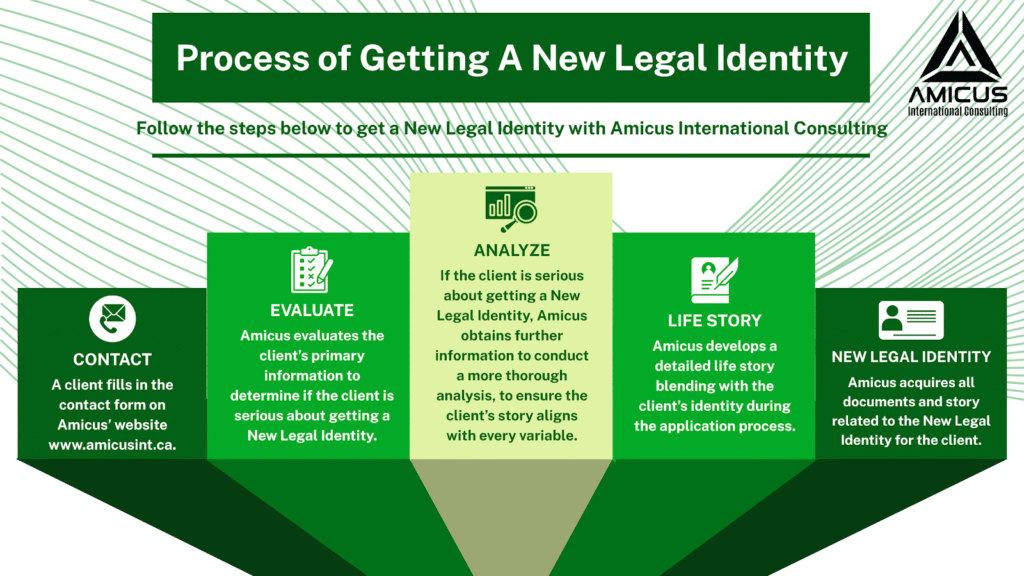VANCOUVER, British Columbia — In an age where every keystroke is recorded, every facial scan stored, and every data trail sold or weaponized, the idea of vanishing without a trace has shifted from spy novels to legitimate global strategy.
Whether fleeing abuse, reclaiming dignity after a ruined reputation, or restarting life in the face of persecution, the right to legally change your name, ID, and history has become a critical instrument of personal liberty. In its latest release, Amicus International Consulting outlines the definitive legal framework for disappearing from your past and building a future with total legal integrity.
The process is not about deception—it’s about lawful detachment from trauma, danger, or public condemnation. This press release explains the modern legal pathways to name change, document renewal, history shielding, and jurisdictional reinvention. It includes expert insight, case studies, and practical strategies for individuals pursuing lawful anonymity.
Why People Choose to Vanish in 2025
The motivations for erasing one’s trace are varied but increasingly legitimate:
- Escaping violent domestic or political persecution
- Breaking from a wrongfully publicized criminal case
- Rebuilding after digital or financial identity theft
- Protecting children or dependents from stalkers or abusers
- Severing ties with an unsustainable online or financial record
For many, the option of a complete reset offers not only safety but also survival.
Case Study: A Banker Caught in a Smear Campaign
After false allegations tied to a bank’s internal scandal, a German executive was left unemployable despite legal exoneration. With Amicus’s help, he changed his name legally through a notarial process in Paraguay, received a new passport, and reestablished his financial career in Georgia using new tax IDs and a clean credit history. The false stories were delisted from search engines under European privacy laws. Today, he manages investments globally without risk of exposure.
Step One: Eligibility and Legal Justification
Amicus begins by ensuring that clients are pursuing identity change lawfully. This includes:
- Verifying that the individual is not attempting to evade criminal responsibility
- Confirming that the individual is under real threat, harassment, or unjust exposure
- Evaluating existing records that can be expunged or sealed
- Mapping the individual’s jurisdictional entitlements based on nationality, residency, and prior documentation
Clients undergo a risk and intent assessment. Only those with verifiable need and legal alignment are accepted into the process.
Step Two: Jurisdictional Selection for Reinvention
Amicus maintains a comprehensive index of countries ranked by their friendliness toward identity reinvention. Factors include:
- Court or administrative name change access
- Privacy rights in civil registry and court proceedings
- Ability to obtain new ID cards and passports
- Whether birth certificates can be reissued or annotated
- Level of exposure to global data-sharing regimes
Top choices in 2025 include:
- Paraguay: Offers permanent residency, open civil name changes, and document reissuance
- Uruguay: High privacy, sealed court records, and ID replacement under a new identity
- Georgia: Fast legal name change, disconnected biometric systems, and banking ease
- Dominica and Antigua: Citizenship-by-investment programs that provide entirely new identity structures
- Turkey: Robust judicial pathway for identity reinvention and data isolation
Step Three: Legal Name Change
A legal name change is the core of identity transformation. This is executed through:
- Court order (e.g., in Uruguay, Georgia, and Turkey)
- Notarial deed or civil registry process (e.g., in Paraguay, Panama, and Mexico)
- Citizenship issuance (e.g., Dominica, Antigua)
- Post-asylum designation (for political or humanitarian cases)
This new name is applied retroactively across national documents, creating a break between former and new identities.
Step Four: Document Renewal and ID Synchronization
Once the name is changed, Amicus oversees the reissuance of all core identification documents:
- National identity card and driver’s license
- Taxpayer identification numbers
- Birth certificate reissuance or annotation
- Voter registration and residency certification
- Travel documents and visa applications
This step ensures that all official channels accurately reflect the new identity and that background checks are aligned accordingly.

Case Study: The Teacher Who Rebuilt in Latin America
After facing harassment from a former partner and viral exposure of personal medical data, a Canadian teacher sought help from Amicus. She moved to Costa Rica under a special protection visa, received a court-sanctioned name change, and was issued a new Cedula and national ID. Her teaching license was renewed under her new identity, and she now lives in peace with no digital links to her past.
Step Five: History Shielding and Record Erasure
To truly vanish, history must be either sealed or legally erased. Amicus assists clients by:
- Petitioning courts to expunge or seal arrest and civil records
- Using GDPR, CCPA, and global data privacy laws to remove online content
- Coordinating takedown requests with search engines and archives
- Removing identifiers such as facial images, IP logs, and biometric trails
- Unlinking social media and online reputation profiles through AI de-indexing
Legal erasure is possible in many jurisdictions, particularly those bound by GDPR (EU), PDPB (India), LGPD (Brazil), and related frameworks.
Step Six: Financial Identity Reconstruction
To live without exposure, a new financial identity must be created. This includes:
- Opening new bank accounts with fresh IDs
- Applying for credit using clean documentation
- Registering businesses under new legal ownership
- Creating offshore trusts or LLCs to hold and protect assets
- Unwinding ties to previous bank accounts or financial obligations where permitted
Jurisdictions such as Georgia, Armenia, Belize, and Nevis offer financial privacy and minimal reporting requirements under the new identity.
Step Seven: Digital Death and Online Disassociation
Modern exposure is primarily digital. Amicus executes a full digital death protocol:
- Scrubbing all social accounts, professional listings, and photos from public view
- Requesting removal of news articles, blogs, and indexed documents
- Deploying AI tools to detect and erase metadata
- Setting up new IP addresses, phone numbers, email, and device profiles
- Creating new domains, bios, and online presences under the new name
The goal is not invisibility—it’s disconnection. The new persona must stand alone without echoing the past.
Step Eight: Social and Legal Rebirth
Once the new identity is functional, Amicus guides clients in adopting their new life:
- Creating a credible personal backstory and timeline
- Adjusting legal statements, work histories, and education claims
- Rebuilding resumes, bios, and family narratives
- Reintegration into employment, education, or residency systems
- Psychological coaching for identity adjustment and memory control
Rebirth is both legal and emotional. Amicus provides support for the entire transition.
Case Study: The Activist Who Found Safety
An LGBTQ+ activist from Eastern Europe faced death threats after attending international protests. Amicus arranged her relocation to Uruguay, where she received asylum status, a new name, and a national ID. Her past was sealed under protection laws, and she now works anonymously in human rights consulting without digital exposure.
Long-Term Protection of a New Identity
Creating a new identity is only the first step. Amicus ensures it remains secure by providing:
- Annual legal reviews and security audits
- Assistance with renewals of documents and bank accounts
- Travel planning under new credentials
- Contingency plans for exposure or re-linking threats
- Second-layer identity construction for future use if needed
Clients receive a secure vault of records, a legal opinion letter, and a jurisdictional map for international mobility under the new identity.
Expert Commentary: The Law Supports Reinvention
A compliance strategist with Amicus states, “Most of our clients are not hiding from justice. They are hiding from injustice—from exes, mobs, algorithms, or false media narratives. The legal tools we use are not loopholes—they are protections embedded in constitutions, treaties, and human rights frameworks.”
He continues, “Every ID we produce is valid. Every name change is legal. We do not fake—we facilitate truth-based transformation, with the law behind every step.”
Emerging Legal Trends in Identity Reinvention
- Data amnesty bills: Brazil and India propose legislation to allow digital expungement of minor past offences
- Interpol delisting initiatives: More countries now support the removal of outdated notices for politically targeted individuals
- Blockchain identity shields: Nations such as Palau, Estonia, and the UAE allow pseudonymous blockchain identities for legal use
- Refugee document reform: UNHCR and affiliated governments now offer rebuilt ID documents for people fleeing persecution
- Gender-based privacy reform: Countries like Argentina, Chile, and New Zealand offer sealed ID transitions for LGBTQ+ individuals
Amicus International Consulting: Building Safe Lives From the Ground Up
Amicus provides the world’s most comprehensive identity reinvention services, including:
- Eligibility and legal compliance screening
- Jurisdiction and relocation planning
- Full document synchronization and legal name change
- Financial reintegration and banking systems under a new identity
- Digital disconnection and new online persona creation
- Psychological transition support
- Ongoing identity management and legal defence
Clients must pass stringent ethical reviews. Amicus does not support fugitives, debtors evading court orders, or individuals engaging in criminal activity.
Conclusion: You Are Not Your Past
In a world that refuses to forget, the right to reinvent one’s identity has become a human right. The legal right to vanish—to change your name, documents, and public history—is not a threat to justice. It is a path to peace, freedom, and survival.
Amicus International Consulting stands at the forefront of that path. Through lawful, structured identity transformation, clients are rebuilding lives with legitimacy and security. They are not disappearing—they are reappearing on their terms.
Contact Information
Phone: +1 (604) 200-5402
Email: info@amicusint.ca
Website: www.amicusint.ca



